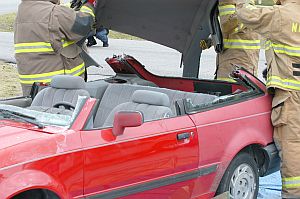Car Accidents and Delayed Symptoms: What You Need to Know
 Even if your recent fender bender didn’t seem too serious, there’s still a very real chance that you or your passengers may have been hurt. That’s because even the most minor car accidents can cause hidden injuries and delayed symptoms. And while damage to your car is likely obvious and easy to assess, evaluating damage to your body may be far more difficult. In fact, it’s not unusual for a driver or passenger to walk away from a collision with potentially serious musculoskeletal injuries (such as a concussion or whiplash), without knowing it.
Even if your recent fender bender didn’t seem too serious, there’s still a very real chance that you or your passengers may have been hurt. That’s because even the most minor car accidents can cause hidden injuries and delayed symptoms. And while damage to your car is likely obvious and easy to assess, evaluating damage to your body may be far more difficult. In fact, it’s not unusual for a driver or passenger to walk away from a collision with potentially serious musculoskeletal injuries (such as a concussion or whiplash), without knowing it.
Because of the stress response, right after an accident the body’s defenses are on high alert. Any pain may be masked by endorphins produced by the body during and shortly after this kind of traumatic event. Endorphins help the body manage pain and stress and can create a temporary euphoria or “high” feeling. When the threat of the accident is gone, endorphin production slowly disappears, allowing you to feel pain that may have remained hidden earlier.
Perhaps the most common delayed symptom is that of whiplash. Whiplash consists of soft tissue damage in the neck from the sudden acceleration and deceleration of the head, creating hyperflexion and hyperextension of the neck. This can not only cause damage to the muscles, tendons and ligaments of your neck, it can also occasionally fracture or dislocate vertebrae and cause any of the following symptoms to show up later:
- Headaches
- Reduced range of motion or difficulty moving
- Slowed reflexes
- Vertigo
- Muscle spasms
- Localized weakness or numbness
- Stiffness in shoulders and arms
Every bit as serious as any broken bones or lacerations, a concussion can prove to be a grave threat to your health. Quite simply, a concussion is the result of the brain colliding with the inside of the skull from a rapid acceleration or deceleration. Not all concussions occur because of bumping the head. If the head is restrained in any way and the restraint suddenly stops or suddenly jerks into motion, a concussion may occur. Symptoms of concussion include the following:
- Headaches
- Bad temper
- Nausea
- Spasms
- Loss of balance
- Blurred or double vision
- Disorientation
- Confusion
- Amnesia
- Ringing in the ears
- Difficulty concentrating or reasoning
- Anxiety or depression
- Tiredness, sleeplessness, or other problems with your ability to sleep
The key point with any of these symptoms is to know whether or not you had them before the accident. Someone who knows you or lives with you can help identify any changes in your behavior that may indicate a possible concussion. If you didn’t have a symptom that you’re now experiencing, see your doctor right away.
In addition to the health consequences of car accidents with delayed symptoms, there is also the insurance aspect to consider. Because many accident-related injuries don’t show up immediately, you may have to pay out-of-pocket for the medical expenses from any delayed symptoms if you settle with your insurance company right away. Therefore, consider waiting a few days before signing any release of liability so that any delayed symptoms have an opportunity to reveal themselves. Seeing a chiropractor for a medical evaluation as soon as possible after an accident is also a good idea, since he or she can help identify injuries and start treatment promptly. In many cases, seeking appropriate medical care soon after an accident can improve your chances of a more complete and more rapid recovery.